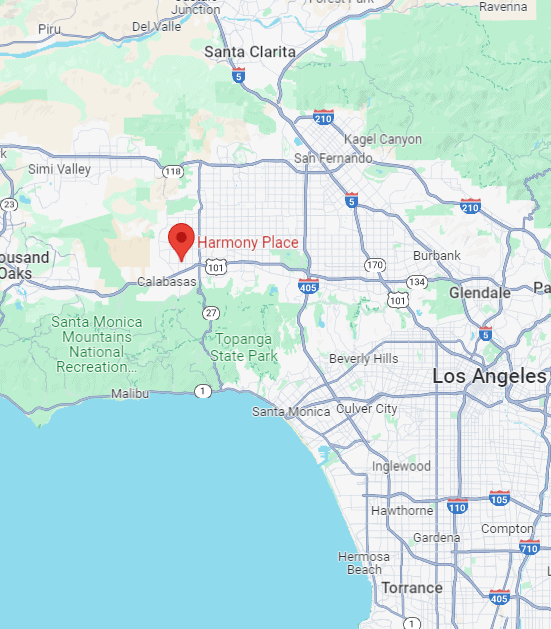Individual Therapy in Los Angeles, CA
Harmony Place in Los Angeles, California, offers comprehensive individual therapy programs designed to help clients heal through personalized, one-on-one support. Our expert addiction therapists provide a safe, compassionate environment where individuals can work through emotional challenges, strengthen resilience, and begin the journey toward lasting recovery and mental wellness.
At our Los Angeles rehab center, our individual counseling sessions integrate evidence-based methods such as Cognitive Behavioral Therapy (CBT) and Dialectical Behavior Therapy (DBT) to meet each client’s unique needs. Whether you’re addressing addiction, mental health concerns, or co-occurring disorders, our goal is to help you gain clarity, develop coping strategies, and achieve long-term emotional balance. Learn more about our individual therapy in Los Angeles and take the first step toward a healthier, more fulfilling life today.
What Makes Therapy for Young Adults Unique?
Therapy for young adults is unique because it addresses the specific challenges and transitions during this sensitive and pivotal time in your life. As a young adult, you face critical decisions about your education, career, relationships, and personal identity. These years are marked by significant growth and change, which can sometimes lead to feelings of uncertainty and stress.
Individual therapy in Los Angeles provides a supportive space to explore these issues, develop coping strategies, and build resilience. It helps you navigate the complexities of this developmental stage, ensuring you have the tools to thrive and establish a solid foundation for your future. Therapy empowers you to achieve your goals and improve your well-being by focusing on your unique needs.
What Makes Individual Therapy Specific for Adults?
Individual therapy for adults is specific because it focuses on the unique challenges and life stages people encounter during adulthood. These years can be sensitive and pivotal as you navigate significant responsibilities, career pressures, relationship dynamics, and personal growth.
Behavioral therapy in Los Angeles offers a personalized approach to help you manage stress, overcome obstacles, and make informed decisions. It provides a safe space to explore your thoughts, feelings, and behaviors, fostering self-awareness and emotional resilience. Individual therapy empowers you to develop effective coping strategies, enhance your well-being, prevent relapse, and achieve a balanced, fulfilling life by addressing your specific needs and concerns. This tailored support is crucial in helping you thrive through adulthood’s various phases and transitions.
What Are the Therapeutic Approaches to Individual Therapy?
Therapeutic approaches to individual therapy include cognitive behavioral therapy (CBT), dialectical behavior therapy (DBT), psychodynamic therapy, and person-centered therapy. These methods address your unique challenges during your young adult years, a sensitive and pivotal time. During these years, you encounter transitions in your career, relationships, and personal development, which can bring about stress and uncertainty.
Each therapeutic approach to mental wellness provides tailored strategies to help you navigate these changes, build resilience, and achieve personal growth. Whether you need to develop coping mechanisms, gain deeper self-awareness, or improve emotional regulation, individual therapy offers the support and guidance necessary to enhance your well-being and thrive during this critical stage of life. Harmony Place Rehab Center can help. Contact us to learn more about our psychotherapy and cognitive therapy options.
Statistics and Information on Therapy and Treatment in Southern California
In 2019, mental health challenges were widespread in California. According to a July 2022 report from the California Health Care Foundation, approximately 1 in 26 adults faced serious mental illnesses impairing daily life. About 1 in 7 adults dealt with mental, behavioral, or emotional disorders.
Among children statewide, 1 in 14 experienced severe emotional disturbances affecting family, education, and social interactions. In Los Angeles County, 3.8% of adults had severe mental illness, and 7.4% of children faced serious emotional disturbance.
What Types of Disorders Are Treated With Individual Therapy in Southern California?
Individual therapy in SoCal treats various mental health disorders. Commonly addressed disorders include anxiety, depression, bipolar disorder, PTSD, OCD, and eating disorders. Mental health therapy in Los Angeles provides tailored strategies to help individuals manage symptoms, improve well-being, and achieve personal growth. Here are just a few examples.
Depression Therapy
Depression therapy provides you with the support and tools needed to manage and overcome feelings of sadness, hopelessness, and loss of interest in the activities you enjoy. Through personalized sessions, therapists help you explore the underlying causes of your depression, develop coping strategies, and build emotional resilience.
Cognitive behavioral therapy (CBT), talk therapy, and mindfulness can help you challenge negative thought patterns and improve your mood. Working with a therapist, you gain insight into your emotional well-being, develop healthier habits, and regain control and purpose in your life. Depression therapy is a compassionate and effective path to healing and recovery.
Bipolar Disorder Therapy
Therapy for bipolar disorder provides you with the support and strategies you need to manage the intense mood swings that are associated with this condition. Through personalized sessions, your therapists help you understand your triggers, develop coping mechanisms, and maintain stability.
Therapeutic techniques like cognitive behavioral therapy (CBT) and mood charting can assist in identifying patterns and creating effective treatment plans. You will learn to navigate both manic and depressive episodes, enhance your emotional regulation, and improve your overall quality of life. Bipolar disorder therapy offers a structured and supportive approach to help you achieve balance and well-being, empowering you to lead a fulfilling and stable life.
ADHD Therapy
ADHD therapy offers you the tools and support to manage your symptoms of attention deficit hyperactivity disorder effectively. Through personalized sessions, therapists help you understand the nature of ADHD, develop organizational skills, and improve focus and self-control. Techniques like cognitive behavioral therapy (CBT) can aid in reducing impulsivity and enhancing concentration.
You will learn practical strategies for managing daily tasks, improving time management, and fostering better relationships. ADHD therapy provides a structured approach to help you overcome challenges, boost your self-esteem, and achieve tremendous success in various aspects of your life, empowering you to reach your full potential.
Social Anxiety Therapy
Social anxiety therapy offers you effective strategies to overcome the intense fear and self-consciousness associated with social interactions. Through personalized sessions, therapists help you understand the things that cause your anxiety and develop coping strategies you can use to help manage your symptoms.
Cognitive behavioral therapy (CBT), exposure therapy, and other types of therapy can help you challenge negative thoughts, gradually face social situations, and build confidence. You will work with a therapist to learn to navigate social settings more comfortably, improve your communication skills, and reduce avoidance behaviors. Social anxiety therapy provides a supportive and structured approach to help you gain control over your anxiety, fostering healthier relationships and enhancing your overall quality of life.
OCD Therapy
OCD therapy offers you effective tools to manage and alleviate the distressing symptoms of obsessive-compulsive disorder. Through personalized sessions, therapists help you understand the underlying causes of your obsessions and compulsions and develop strategies to reduce their effect on your daily life.
Exposure and response prevention (ERP), cognitive behavioral therapy (CBT), and other therapies can help you gradually confront your fears and learn healthier ways to cope with anxiety. Working with a therapist, you gain insights into your thought patterns, improve your ability to resist compulsive behaviors, and regain control. OCD therapy provides a structured and supportive environment to help you achieve significant improvements in managing your symptoms and improving your overall well-being.
PTSD Therapy
Post-traumatic stress disorder, or PTSD, therapy provides you with essential support and tools to address the symptoms of PTSD effectively. Through personalized therapy sessions, your therapist can help you process traumatic experiences, manage flashbacks, and cope with overwhelming emotions.
Trauma recovery methods such as cognitive processing therapy (CPT) and eye movement desensitization and reprocessing (EMDR) can help you process your traumatic memories and reduce distressing symptoms. You can learn to regain a sense of safety, rebuild trust in yourself and others, and develop healthier ways to manage stress. PTSD therapy offers a compassionate and structured approach to help you heal from past trauma, improve your quality of life, and move forward with greater resilience and strength.

We Will Check Your Insurance
What Are the Types of Individual Therapies Offered in Los Angeles?
LA offers various types of individual therapies to address diverse mental health needs. Therapies include cognitive behavioral therapy (CBT), dialectical behavior therapy (DBT), psychodynamic therapy, mindfulness-based therapies, and more, tailored to each individual seeking support. Below are just a few examples.

Individual Supportive Therapy
Individual supportive therapy provides a compassionate and non-directive approach to exploring your thoughts, feelings, and experiences in a safe environment. Through personalized sessions, therapists offer empathetic listening and validation, helping you gain insights into your emotions and challenges.
This therapy focuses on enhancing your self-awareness, building confidence, and promoting personal growth at your own pace. Unlike more structured therapies, supportive therapy allows you to guide the conversation during your healing process while receiving unconditional emotional support and encouragement from your therapist. It’s designed to foster a trusting therapeutic relationship in which you can freely express yourself and work toward achieving greater emotional well-being and resilience in everyday life.
Christian Therapy
Christian therapy in Los Angeles integrates faith-based principles and practices into your therapeutic journey, offering a supportive environment to explore psychological challenges through a spiritual lens. Through personalized sessions, therapists incorporate biblical teachings and prayer, helping you align your mental health goals with your Christian beliefs and values.
This approach may include exploring issues such as forgiveness, purpose, and relationship dynamics within the context of your faith. Christian therapy fosters spiritual growth, comforts in times of distress, and strengthens your connection with God while addressing psychological concerns. It offers a holistic treatment approach to healing that respects and integrates your spiritual beliefs into the therapeutic process.
Faith-based or religious therapy incorporates your spiritual beliefs and values into the therapeutic process, offering a supportive environment to explore mental health challenges through a religious lens. Therapists integrate teachings, rituals, and practices from your faith tradition through personalized sessions to help you find meaning, guidance, and healing.
This approach respects and aligns with your spiritual journey, addressing issues such as identity, purpose, and moral dilemmas within the context of your religious beliefs. Faith-based therapy aims to strengthen your faith, provide comfort during difficult times, and promote overall well-being by integrating spiritual and psychological insights into your path toward healing and growth.
Behavioral Therapy
Behavioral therapy is a psychological intervention that focuses on identifying and modifying behaviors that contribute to mental health challenges. Through structured sessions, you will understand how your thoughts and actions influence your emotions and behaviors. Methods like dialectical behavior therapy (DBT) or cognitive behavioral therapy (CBT) can help teach practical skills for managing stress and changing harmful behavioral patterns.
By setting specific goals and practicing new behaviors, you can learn effective strategies to overcome obstacles, enhance your coping mechanisms, and achieve positive outcomes. Behavioral therapy provides a systematic approach to empowering you to take control of your mental health and improve your overall well-being.
Anger Management Therapy
Anger management therapy in Los Angeles offers practical strategies for effectively recognizing and controlling your emotions. Through tailored sessions, therapists help you understand the triggers and underlying causes of your anger. Cognitive restructuring, relaxation techniques, and assertiveness training are employed to develop healthier responses to anger-provoking situations.
Exploring patterns and learning alternative ways to express and manage anger can improve communication, relationships, and overall emotional well-being. Anger management therapy provides a supportive environment to learn constructive approaches to handling anger, empowering you to navigate challenges with greater calmness and resilience in your daily life.
Grief Counseling Therapy
Grief counseling in Los Angeles provides you with compassionate support and guidance during the complex process of mourning and healing from loss. Through personalized sessions, therapists help you navigate the stages of grief. Techniques such as narrative therapy, mindfulness practices, and support groups may be used to explore your feelings, memories, and challenges associated with the loss.
By honoring your unique grieving process and providing a safe space to express your emotions, grief counseling helps you find meaning, adjust to life without your loved one, and eventually find a renewed sense of hope and purpose. It offers a therapeutic journey toward healing and emotional resilience in the face of loss.
Dialectical Behavioral Therapy
Dialectical behavioral therapy (DBT) emphasizes regulating emotions. In other words, this therapeutic method teaches clients how to handle emotional turmoil productively. As a branch of CBT, dialectical behavioral therapy shares the same core values as cognitive behavioral therapy. However, unlike cognitive behavioral therapy, DBT prioritizes change and acceptance. By balancing these elements, recovering patients are less likely to succumb to toxic habits.
Interpersonal Therapy
Interpersonal therapy is equally effective. As a disease, addiction negatively affects everyone in its path. To remedy the widespread wounds that addiction causes, interpersonal counseling seeks to improve a patient’s familial relationships and social connections. Though this form of individual therapy ties in family and friends, these relationships contribute to your well-being.

How to Find an Individual Therapy Program in Los Angeles, CA
If you’re searching for an individual therapy day treatment program in Los Angeles, Harmony Place provides accessible, high-quality mental health care tailored to your needs. Our programs offer a structured yet flexible approach, combining evidence-based therapies with personalized support to help you achieve lasting emotional wellness.
Whether you require residential care for a more immersive experience or outpatient services for continued support, our expert clinicians are dedicated to helping you build resilience and develop effective coping strategies. Contact Harmony Place at (855) 652-9048 to explore your treatment options and receive personalized assistance in finding the right program for you.
How to Find a Personal Therapy Program Near Me
Finding a personal therapy program near you in the Golden State involves several steps to ensure you find the proper support. Start by searching online, checking your insurance coverage, and reading reviews. You can also visit facility websites or contact them to ask about their services and availability.
- Search Online: Use Google or another search engine to find therapy programs nearby. Example search terms include “personal therapy near me,” “individual therapy programs in [your city],” or “mental health day treatment programs near [your location].”
- Review Search Results: Browse your search results to find therapy facilities and programs offering individual therapy sessions. Pay attention to their services and location.
- Check Your Insurance Coverage: Visit your insurance provider’s website or call their customer service to find therapists and facilities in your network.
- Read Reviews and Testimonials: Look for reviews and testimonials from clients who have used the therapy programs to get a sense of their experiences and satisfaction.
- Visit Facility Websites: Explore the websites of potential therapy programs to learn more about their therapists, treatment approaches, and the types of therapy offered.
- Contact the Facility: Once you’ve narrowed your options, contact the therapy facility directly. Ask about their availability, specific therapy approaches, insurance acceptance, and other questions.
Harmony Place
23041 Hatteras St.
Woodland Hills, CA 91367
Harmony Place East
22913 Burbank Blvd.
Woodland Hills, CA 91367
Valley Restoration Center
22900 Ventura Blvd, STE 314,
Woodland Hills, CA 91364
Addiction Treatment Programs in Los Angeles Offer Individual Therapy?
Yes, addiction day treatment programs in Los Angeles, including those at Harmony Place Addiction Recovery, offer individual therapy programs designed to support lasting recovery. Harmony Place provides personalized care for adults struggling with substance use disorders, offering compassionate guidance throughout every step of the healing process.
Through one-on-one individual therapy sessions, clients work closely with licensed therapists who specialize in addiction recovery and co-occurring mental health conditions. These sessions focus on identifying triggers, building coping strategies, and addressing underlying emotional or behavioral challenges that contribute to substance use. By engaging in individual therapy at Harmony Place, clients receive focused, evidence-based support to rebuild confidence, strengthen resilience, and maintain long-term sobriety. This personalized approach ensures each person receives the dedicated attention and care needed to truly recover and thrive in their journey toward a substance-free life.
Does Health Insurance Cover Individual Therapy for Substance Abuse in Los Angeles?
Yes, many health insurance plans cover individual therapy for substance abuse in Los Angeles, including one-on-one sessions designed to support addiction recovery. Coverage levels vary depending on your provider and policy, but most plans include benefits for individual therapy programs and addiction counseling services as part of behavioral health treatment.
At Harmony Place in Los Angeles, we work directly with major insurance carriers to help you access affordable, personalized care. Our individual counseling sessions are part of a comprehensive addiction treatment approach that combines evidence-based therapies with compassionate, one-on-one support. Whether you’re seeking residential or outpatient services, our admissions team can verify your insurance, explain your coverage for individual therapy in Los Angeles, and help you begin recovery with confidence. Contact us today to learn more about your options and start healing.
Health Insurance Providers That Cover Individual Therapy in Los Angeles
Several major health insurance providers cover individual therapy in Los Angeles, making it easier for those seeking addiction or mental health treatment to access personalized, one-on-one care. Leading companies such as Blue Cross Blue Shield (BCBS), UnitedHealthcare, Aetna, Cigna, and Humana typically include coverage for individual therapy programs as part of their behavioral health benefits.
Coverage and eligibility may vary depending on your specific plan and provider, so it’s important to review your policy details to understand what’s included and any out-of-pocket costs. At Harmony Place in Los Angeles, our admissions team can help you verify insurance benefits, explore individual counseling options, and connect with the right level of care for your needs. Contact us today to learn more about one-on-one therapy coverage and available treatment programs in Southern California.
Understanding When to Enroll in an Individual Therapy Program
Understanding when to enroll in a day treatment individual therapy program is crucial for addressing mental health needs effectively. Examples include experiencing heightened stress, struggling with daily functioning, facing relationship challenges, or coping with trauma. Recognizing these signs can prompt seeking professional support to enhance your emotional well-being.

Social Circles Influencing Well-Being
Social circles can significantly influence well-being by shaping attitudes, behaviors, and emotional responses. Positive social relationships can provide support, reduce stress, and enhance happiness. Conversely, harmful or toxic relationships may contribute to anxiety, depression, and unhealthy habits.
By surrounding yourself with supportive and nurturing individuals, you can cultivate a healthier mindset and improve overall mental and emotional health. It’s essential to consciously assess and nurture your social circles, ensuring they contribute positively to your well-being and provide a strong foundation for personal growth and happiness.
Career-Related Stress and Its Impact on Mental Health
Career-related stress can significantly affect your mental health by increasing anxiety, lowering mood, and affecting overall well-being. Long hours, high pressure, and job insecurity can lead to burnout, exhaustion, and difficulty coping with everyday challenges. Recognizing signs of stress, such as irritability, sleep disturbances, and lack of motivation, is essential.
Managing stress, such as setting boundaries, prioritizing self-care, and seeking support from colleagues or professionals, can help mitigate its effects. By addressing career-related stress proactively, you can improve your mental resilience and maintain a healthier work-life balance.
Daily Stressors and Their Effect on Mental Health
Daily stressors, such as financial concerns and traffic, can increase anxiety and affect mood. Constant exposure to stressors can lead to physical symptoms, including headaches, digestive issues, and emotional strain, such as irritability or difficulty concentrating.
Recognizing these effects and practicing coping strategies like mindfulness, exercise, or relaxation techniques to manage stress effectively is essential. Creating a supportive environment, prioritizing self-care, and seeking professional help can mitigate the adverse effects of daily stressors on your mental well-being, promoting overall resilience and emotional balance.
Personal Health Challenges Affecting Overall Well-Being
Personal health challenges, whether physical or mental, significantly influence your overall well-being. Conditions like chronic illness, pain, or mental health disorders can affect daily functioning, mood, and quality of life. These challenges involve seeking appropriate medical care, adopting healthy lifestyle practices, and addressing emotional needs through therapy or support networks.
To optimize your health outcomes, prioritize self-care, set realistic goals, and communicate openly with healthcare providers. Taking proactive steps to manage personal health challenges can enhance resilience, improve overall well-being, and maintain a balanced and fulfilling life.
Family Dynamics and Their Influence on Behavior
Family dynamics help shape your behavior and overall well-being. Positive interactions and support within the family unit can foster confidence, security, and healthy communication skills. Conversely, negative dynamics, such as conflict or dysfunction, may contribute to stress, anxiety, and behavioral patterns that impact relationships and personal growth.
Understanding these dynamics helps you navigate challenges more effectively, set boundaries when necessary, and seek support or family therapy to improve relationships. Fostering a supportive family environment can enhance emotional resilience, promote positive behaviors, and cultivate healthier relationships both within and outside the family unit.
Parental or Family Influence on Young Adult Behavior
Parental or family influence plays a pivotal role in shaping young adult behavior. Positive role modeling, guidance, and support from parents or family members can contribute to confidence, resilience, and healthy decision-making skills. Conversely, negative influences or lack of support may lead to uncertainty, risky behaviors, or emotional challenges.
Understanding these dynamics allows you to navigate relationships with greater awareness, set boundaries where needed, and seek guidance from supportive adults or mentors. By fostering constructive family interactions and communication, you can positively impact young adult behavior, encourage personal growth, and support their journey toward independence and well-being.

A Glimpse Into Our Los Angeles Individual Therapy
With its unrelenting grip and harmful consequences, addiction is as complex as it is disastrous. For this reason, those who struggle with addiction regard recovery as an uphill battle. While the healing process demands resilience, substance use counseling breathes compassion and peace of mind into rehabilitation. Like its name suggests, our individual therapy in Los Angeles consists of one-on-one counseling sessions.
During these appointments, you’ll discuss the emotional struggles, mental health setbacks, and trauma that come with addiction and recovery. In most cases, individual therapy works in tandem with group therapy. Group and individual counseling aim to alleviate emotional pain and discomfort, promote healthy coping mechanisms, and encourage positive thinking. It’s up to you and your therapist to determine which areas require improvement, but most individual therapy sessions hone in on eliminating symptoms, navigating life transitions, and managing inner conflict.
As critical components of addiction treatment, individual therapy tackles problems head-on. By confronting deep-seated issues, you’ll gain a deeper understanding of what caused your addiction. From there, you’ll peel back the layers of these traumatic events, uncovering buried emotions and suppressed feelings along the way. While this transformative experience will prove challenging, emotional breakthroughs await.
Above all else, individual substance abuse counseling aids in relapse prevention. After all, learning how to identify and overcome triggers is exceedingly difficult. With that said, professional intervention is warranted. With guidance from a counselor, you’ll be better equipped to deal with triggering circumstances as they inevitably arise. From personal betterment to situational awareness, the realizations that individual therapy promises are enlightening.
The Benefits Of Individual Counseling During Treatment
The reality of suffering from a substance use disorder is difficult to accept. Even more difficult than accepting the reality of it all, though, is admitting that you need help. Everybody wants to believe in the best of themselves. Someone admitting they may have a problem is a huge step in the right direction.
However, that doesn’t change the fact that looking for the right treatment option is scary.
When it comes to treatment, some people might consider many different options. Some may do best with inpatient treatment, while others thrive with medically assisted detox. However, the most important thing is that each person who struggles receives care that is tailor-fit to their unique needs.
Individual therapy in Los Angeles at Harmony Place allows individuals to receive one-on-one therapy that helps them grow toward a place of stability and sobriety.
Increases Self-Awareness
The things you do and say have a direct impact on your mental health. With that in mind, it’s essential to have conscious knowledge of your feelings, motives, and desires. With individual therapy, you’ll delve deeper into your behavioral makeup. By doing so, you’ll become more in tune with your thoughts and emotions.
This heightened level of understanding will inspire you to reflect on your actions and thinking patterns, which is what self-awareness is all about. As you become more self-aware, you’ll gain a new lease on life. Moreover, you’ll feel more confident in your decision-making. With a healthy perspective and a boost in morale, you’ll set yourself up for a sober lifestyle.
Encourages Self-Exploration
While on the path to recovery, a new you will take shape. As you get to know this enhanced version of yourself, your therapist will facilitate the transition. Bidding farewell to long-lived habits is no easy task. What’s more, you’re likely to become overwhelmed by these developments. Your therapist will lead the way to guarantee that this progression unfolds smoothly. With a helping hand, you’ll realize just how gratifying your transformation can be.
Helps Set Boundaries
Addiction has no regard for boundaries. While creating these protective barriers, you’ll need help setting limits. With your counselor’s objective outlook, you’ll reach healthy conclusions that complement your lifestyle. Not only will this instill simplicity into the process, but it’ll also make you feel more comfortable with the lines you’re drawing in the sand.
Most importantly, you’ll learn how to communicate your boundaries with others. These encounters are often unsettling, and with this uneasiness comes self-doubt. Thankfully, your therapist will guide you through these affairs, detailing the do’s and don’ts to ensure optimal results.
Addiction has no regard for boundaries. While creating these protective barriers, you’ll need help setting limits. With your counselor’s objective outlook, you’ll reach healthy conclusions that complement your lifestyle. Not only will this instill simplicity into the process, but it’ll also make you feel more comfortable with the lines you’re drawing in the sand.
Most importantly, you’ll learn how to communicate your boundaries with others. These encounters are often unsettling, and with this uneasiness comes self-doubt. Thankfully, your therapist will guide you through these affairs, detailing the do’s and don’ts to ensure optimal results.
Improves Communication Skills
For some, having hard conversations can feel like an invitation for confrontation. While in individual therapy, you’ll discover that’s not always the case. From assertiveness and empathy to active listening and respect, a lot goes into effective communication.
Your trusted counselor will show you the ropes, guaranteeing you grasp the ins and outs of communicating your emotions. When uncomfortable discussions happen, you’ll be better prepared to have a productive conversation without relying on drugs or alcohol to numb the discomfort or tension.
Establishes Effective Coping Mechanisms
When uninvited impulses present themselves, you will need to know how to stop temptation in its tracks. Your urges may be strong, but they will be no match for the coping skills you develop in counseling. Alongside your therapist, you will uncover ways to defeat compulsions. While resisting these desires will be challenging, relapsing will present even bigger obstacles.
Receive Undivided Attention
Recovery is accompanied by inexplicable hardship. While dealing with these adversities, you’ll find great comfort in knowing that your therapist is committed to empowering you. This one-on-one attention will validate your concerns and problems, making it easier to heal. Additionally, their wholehearted attention will make you feel safe and heard.
To put it plainly, your counselor serves as your go-to confidant. You will know that the information you reveal is kept secret from them. Even better, they won’t judge you or make you feel inferior. By giving your mental health the attention it deserves, you’ll embark on a path of fruitful recovery.
Provides a Source of Never-Ending Support
The trials and tribulations that come with addiction are too dire to soldier alone. With a therapist, you don’t have to undergo these hurdles solo. Those who battle with addiction know how lonely life can get. When this loneliness takes hold, it wreaks havoc on an individual’s happiness, leading to apathy and self-destruction. The beauty of individual therapy is that constant support is provided.
In essence, recovery is something that should never happen in a vacuum. Attempting to heal on your own will only lead to further devastation. Individual counseling gives you the encouragement you deserve when you need it. Without this guidance, you’re liable to cling to unhealthy habits, making individual therapy a godsend for those with a history of substance abuse.
Life-Altering
Most notably, individual counseling provides a life-changing experience. The emotional clarity it promises has the power to uplift and revamp your life. Sometimes, addiction can make individuals feel stuck. As a result, they come to terms with their situation, unwilling to rewrite reality. Fortunately, individual counseling offers hope and monumental experiences. With an open mind, patients realize that their addiction doesn’t have to dictate their lives any longer.
Best of all, restoration comes with this life-altering healing process. As changes continue to unfold, emotional scars begin to heal, recovery becomes more attainable, and optimism is rebuilt. In other words, individual substance abuse counseling promotes endless possibilities and faith in a brighter tomorrow.
How Long Is a Personalized Therapy Treatment Program?
The duration of a personalized therapy treatment program varies based on a person’s individual needs and treatment goals. Some programs may last a few weeks to address immediate concerns, while others may span several months for more comprehensive support and long-term healing.
Factors influencing program length include the complexity of issues being addressed, progress made during therapy, and the therapeutic approach used. Your therapist will work with you on a treatment plan tailored to your needs, regularly assessing progress and adjusting the duration to ensure effective outcomes and sustained mental health wellness.
How Effective Is Therapy and Day Treatment in LA?
Therapy and day-treatment programs in LA are generally effective in supporting mental health and well-being. These programs offer personalized care and evidence-based therapies that address a range of issues, such as anxiety, depression, trauma, and drug or alcohol addiction. Therapy’s effectiveness depends on factors like the individual’s willingness to engage in the process, the therapist-client relationship, and the consistency of attendance.
Day treatment programs provide structured support during the day, often combining individual therapy, addiction group therapy programs, and skill-building activities to enhance coping strategies and social skills. Many participants report significant improvements in managing symptoms, enhancing resilience, and achieving personal growth. Research and client testimonials often highlight therapy’s effectiveness in promoting long-term mental health recovery without relapse and improved quality of life.
How Much Does Personalized Therapy Cost in Southern California?
The cost of personalized therapy in Southern California can vary widely depending on several factors. Therapist fees typically range from $100 to $250 or more per session, with specialists or those with extensive experience often charging higher rates. Insurance coverage can significantly offset costs, depending on your provider and plan.
Many therapists in-network with insurance providers offer sliding-scale fees based on income, making therapy more affordable. Therapy clinics and community health centers may provide lower-cost options or sliding-scale fees for those without insurance. Check with your insurance provider or Harmony Place for coverage details and explore options that fit your financial situation. Investing in your mental health through personalized therapy can improve your well-being and quality of life.
What Other Forms of Treatment Exist Besides Individual Therapy?
There are many more options for substance use treatment than just individual therapy. These options exist to offer people treatment that caters to their individual needs. There is no one-size-fits-all method for addiction or mental health treatment.
Some people may not respond well to individual therapy. That is why, at Harmony Place, we offer more resources to help those suffering from a substance use disorder.
Treatment Options Defined
What Is Inpatient Treatment?
Inpatient treatment is a method of care in which those who participate do so in an overnight capacity. This allows people who suffer from substance use disorder to receive the care they need on a prolonged basis. Inpatient care could last anywhere from 28 days to six months. This treatment method also includes individual substance abuse counseling throughout the week should the patient require it.
What Is Outpatient Treatment?
Meant for milder forms of a substance use disorder, outpatient treatment is a method of care that allows a person more flexibility; they’re able to stay at home and fulfill their daily responsibilities while attending treatment in the late afternoon or evening. Whether it’s individual therapy, group therapy, or family therapy, counseling is the cornerstone of this treatment method.
What Is Medically Assisted Detox?
Medically assisted detox is much different than programs like holistic therapy or individual substance abuse counseling. This method of treatment allows individuals to get over their withdrawal symptoms with the help of FDA-approved medications. The purpose of the medication is to curb the symptoms of withdrawal under the care of a medical professional.
What Is Sober Living?
Sober living homes nestled in quiet communities allow those suffering from substance abuse to experience a sense of peace and comfort. Those participating can focus on their outpatient care and press into their recovery journey. This is a great option for those who suffer from a mild addiction and are ready to start an outpatient program.
Personalized One-on-One Therapy in Los Angeles at Harmony Place
Finding the right individual therapy in Los Angeles can be a crucial step in recovery and emotional growth. At Harmony Place, our individual therapy program provides clients with focused, compassionate guidance through one-on-one counseling sessions that empower healing and personal transformation.
Our team of licensed professionals in Southern California specializes in individual counseling in Los Angeles for those facing addiction, anxiety, depression, and other mental health challenges. Every session is customized to your goals, ensuring a confidential, supportive path toward change. If you or your loved one is ready to start healing, contact Harmony Place today to learn more about our individual therapy program and comprehensive treatment options in Los Angeles, CA.
Addiction Therapy Programs in Los Angeles
At Harmony Place, our therapy programs help clients develop resilience, emotional balance, and self-awareness. We combine traditional and modern therapeutic methods, including CBT, DBT, motivational enhancement, and group or individual counseling. Explore the resources below to learn more about our therapy services and pricing options in Los Angeles.
- Inpatient Rehab Los Angeles
- Intensive Outpatient Program Los Angeles
- Evening Intensive Outpatient Program
- Medication Assisted Treatment Los Angeles
- Outpatient Rehab Program Los Angeles
- Los Angeles Partial Hospitalization Program
- Medically Assisted Detox LA
- Sober Living Homes and Halfway Houses
- Clinical Care Los Angeles
- Family Therapy Rehab Program
- Couples Rehab Los Angeles
- Men’s Addiction Rehab California
- Women’s Rehab Center SoCal
- Addiction Treatment for Veterans
- Short-Term Addiction Rehab
- Long-Term Addiction Rehab
- Private Luxury Rehab Los Angeles
- Faith-Based Rehab Programs
- Non-Faith-Based Rehab
- Rehab for Professionals LA
- Rehab Aftercare Alumni Programs
Statistics and Information on Day Treatment and Therapy for Mental Health in Los Angeles
In 2019, mental health challenges were prevalent across California’s population, according to a July 2022 report from the California Health Care Foundation. About 1 in 26 adults faced severe mental illnesses that hindered their ability to carry out daily life activities. Additionally, approximately 1 in 7 adults struggled with various forms of mental, behavioral, or emotional disorders.
Among children in the state, 1 in 14 experienced severe emotional disturbances that interfered significantly with their family interactions, learning capabilities, and social relationships. These statistics underscore the widespread impact of mental health issues on individuals of all ages throughout California during that period.
In 2019, in Los Angeles County, 3.8% of adults had a severe mental illness, and 7.4% of children 17 and younger had serious emotional disturbance. The prevalence of adults experiencing severe psychological distress in Los Angeles County increased from 9.8% in 2015 to 13% in 2019.
What Is Los Angeles Commonly Known For?
Los Angeles, commonly known for its vibrant culture and iconic landmarks, is situated on the Pacific Ocean and offers attractions you won’t find anywhere else. You can explore Hollywood, the heart of the entertainment industry, and stroll down the Hollywood Walk of Fame to see your favorite celebrities’ sidewalk stars.
Griffith Park has great city views and the Hollywood sign, perfect for a picturesque outing. Don’t miss the world-famous Santa Monica Beach and Venice Beach, where you can enjoy a boardwalk atmosphere. Additionally, Los Angeles boasts cultural gems such as the Getty Center or the Hollywood Bowl, offering enriching experiences for art enthusiasts.


















